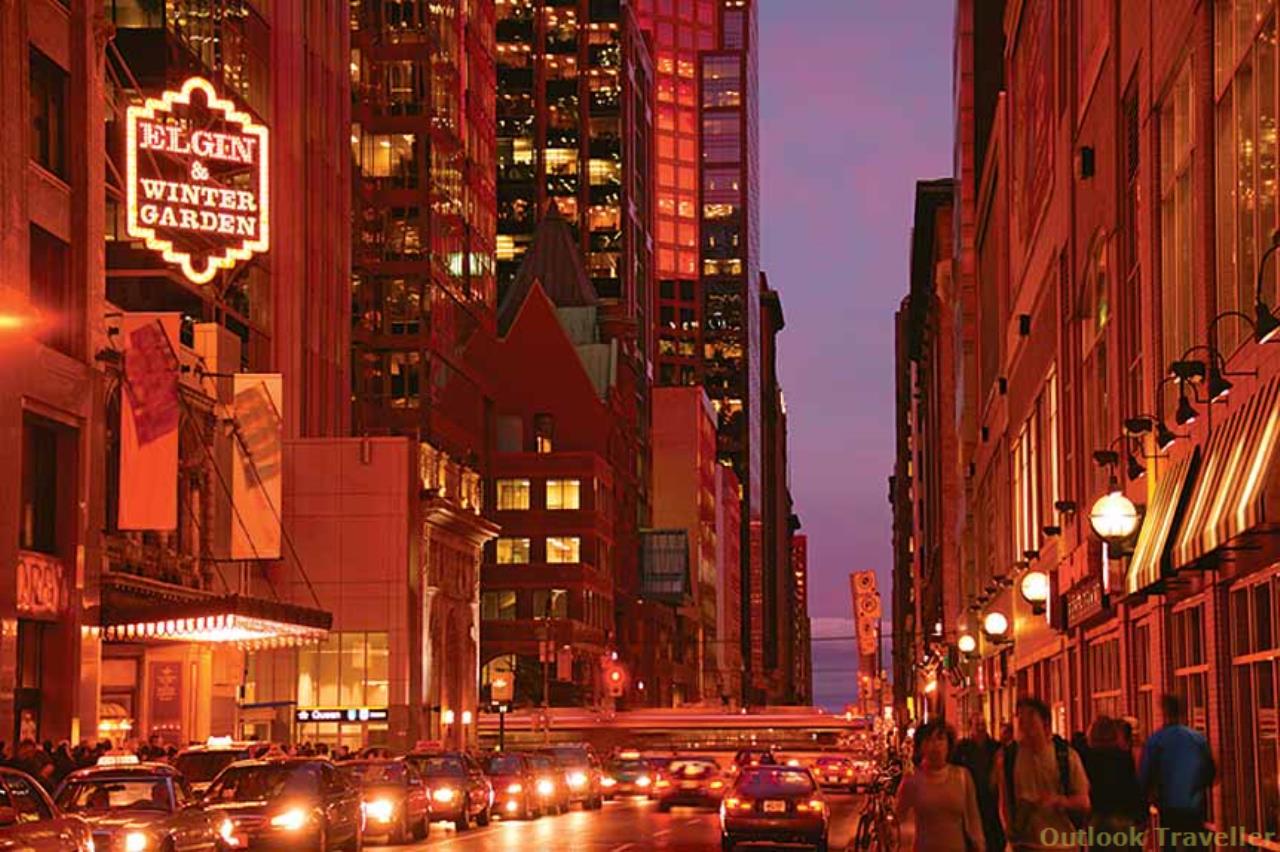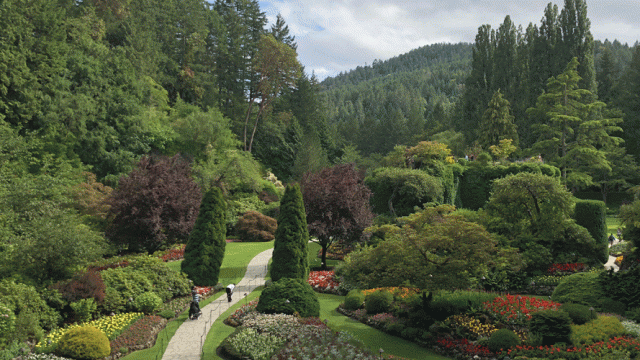Don’t know why, but I’ve never considered going to Canada on a holiday. Even though friends rave
Let’s blame it on America. Somehow, my brain seems hardwired to read ‘North America’ as the USA. I can spin off vast trivia about the US President but have difficulty recalling the name of the Canadian premiere. Similarly, when I think of travelling in North America, I automatically think USA. Somehow, Canada doesn’t register. Reminds me of what Sandra Gotlieb, the wife of a Canadian ambassador to the US, once said: “For some reason a glaze passes over people’s faces when you say ‘Canada’. Maybe we should invade South Dakota or something.”
So I must confess I landed in Toronto’s Pearson International Airport with the bemused insouciance of a big-city girl off to visit a small-town cousin. Like a New Yorker visiting DC. Or a Bombayite going to Delhi. It didn’t help that I had just read P.J. O’Rourke’s description of Canada. “Very little is known of the Canadian country,” wrote this gonzo journalist, “since it is rarely visited by anyone but the Queen and illiterate sport fishermen.”
It was a crisp September morning. Autumn peeking through the fading remnants of a somewhat rainy summer, but still single T-shirt weather. The Toronto International Film Festival was in its last leg. George Clooney was in town and all the buzz with The Men Who Stare At Goats, a Dr Strangelove-like offering on war taken to its illogical conclusion. Dil Bole Hadippa, translated as ‘My Heart Goes Hadippa’ and What’s Your Raashee were also on offer at TIFF, as it’s affectionately called but, no, they weren’t yet sizzling.
My luxe holiday began on a high note, lapping up one of my favourite breakfasts — a yogurt parfait — on top of the city’s most legendary hotel, the Fairmont Royal York. Yogurt parfait — a concoction of yogurt, granola and berries — is one of those utterly healthy snacks artfully disguised to look like a sinful dessert. The secret is partly presentation: a tall parfait glass gives the yogurt the look of whipped cream. And partly packaging: call a cereal a parfait and watch us slurp it up.
I don’t know if the yogurt parfait is Canadian, but I’ve had it in Toronto each time I’ve been there. That’s twice. And I’ve never been offered it anywhere else. So for me, the parfait is to Canada what frozen yogurt is to California or vada pav is to Bombay. Soul food. At another level, the parfait is a perfect metaphor for what is considered good food here: food that is not just tasty but is locally grown, organic, sustainable and, ideally, sourced from farmers in the area. So much so that the distance an ingredient travels to make it to the dining table is measured in ‘food miles’. My parfait couldn’t be more local, since it’s sweetened with honey gathered right on the terrace on which we’re breakfasting — where six beehives feed one-third of the Fairmont Royal York’s yearly honey needs.
The Royal York, as it’s called, is a gilded 1,365-room stone behemoth that is to Toronto what the Taj is to Bombay. A landmark. A meeting point. (“Let’s meet at the gold clock by the spiral staircase in the lobby,” is a common refrain). A point of reference, since it stands right in front of Union Station, the city’s main railway station. When it opened its doors in 1929, this was the tallest building in the British Empire. Since then, not only have three generations of British royalty slept here but so have our own film royals — from Amitabh Bachchan to Shah Rukh Khan.
Fully fortified, I race off down to the gold clock by the spiral staircase to meet Shirley Lum, who will take me on a walking tour. Lum, a fourth-generation Chinese Canadian, runs a variety of specialised walks (excuse the mixed metaphor), right from ‘In the Footsteps of Dickens’, who like me, spent exactly 48 hours in Toronto, to culinary tours through different neighbourhoods sampling Chilean empanadas, Portuguese natas, Montreal-style bagels and Chinese dim sum. Her nightly ‘Haunted Kensington and Chinatown’ walk begins with a well-placed fact: “Toronto means meeting place. But is it a meeting place for the living—or for the dead?”
My walk through TO, as it’s called, begins with the world’s longest street — Yonge Street, which runs 1,896km to another town. Every Torontian I meet is as proud of Yonge Street as we Mumbaiites are of Marine Drive — and at first I don’t quite get it. Yes, great that it’s so long, but a street is a street, right? When Lum explains that Yonge divides the city into east and west and Yonge-Dundas Square is where one million people gathered when the Canadian men’s hockey team defeated the United States for the Olympic gold medal in 2002, I get the cultural significance, if not the visual significance. It still looks like any other street, with shops and restaurants and malls.
A must-do on Yonge is the Eaton Centre, a massive shopping and office complex. I am unmoved by the shops, but I am most taken up by the Canadian artist Michael Snow’s sculpture in the atrium, showing a flock of Canadian geese in flight. Lums tells me that Snow sued the Centre for placing red ribbons around the necks of the geese one Christmas. He won the case and the offending bows were removed.
It is nuggets like these that make Toronto come alive for me. I’ve often walked through neighbourhoods on my own, gazing at architectural curiosities but stone doesn’t always speak. And I’m just too lazy to keep dipping into a guidebook while sniffing around; it doesn’t feel like a holiday then, it feels like work. Luckily, this walking tour didn’t feel like a structured activity (which I resist on holiday); it felt casual. Like we were walking and talking the city, experiencing it, rather than sightseeing and imbibing information (which also I resist).
So we wended our way past the old City Hall, where the architect had cunningly inserted visual symbols of himself into the brickwork after the city’s founding fathers refused to let him put his signature on the façade. Trying to find these symbols was a far more intimate experience of City Hall than gazing perfunctorily at its distinctive clock tower. The building is now used a courthouse, and the workers of Zeller’s Distribution Centre were outside it, loudly protesting at being locked out from their workplace. Next door is the new modernist City Hall built by a Finnish architect — two giant semi-circular towers arcing towards each other. Many people still feel the building looks too futuristic for the city; from the sky it looks like a giant unblinking eye, and was originally nicknamed ‘The Eye of Government’.
Three foot-stomping hours later, I arrive at the Royal Ontario Museum, an architectural hybrid of Italian neo-Romanesque and futurist, now fittingly called ROM. A giant glass-and-steel Crystal entrance has just been added on to the traditional stone portal; the contrast in the two is similar to that of I.M. Pei’s glass pyramid in front of the Louvre in Paris, though not as striking. I lunch at C5, a spare elegant restaurant with soaring peaked ceilings that sits on the Crystal’s pinnacle. Two tastes still linger on my mouth from that meal: a lychee and soda, as refreshingly zingy as nimbu-paani, and a cheese and tomato salad, in which heirloom tomatoes form the main ingredient. Wikipedia tells me that an heirloom veggie is a cultivated plant that was commonly grown during earlier periods in human history, but is not used in modern large-scale agriculture. Since it’s grown in small batches through natural gardening, it’s tasty enough to build a recipe around.
Although I lunch at ROM, I see the exhibits at another museum the next day, stunningly renovated by Frank Gehry, the Toronto-born architect best known for creating the Guggenheim in Bilbao, Spain. From the back, the Art Gallery of Ontario, or AGO, is a startling blue titanium and steel structure overlooking a park. In the front, the sunlit glass and wood Galleria Italia—which allows viewers to see the street while seeing the art — is a supple example of New World design. (New World because Old World museum designs gazed inward — at the art, not the street.)
If ROM is Toronto’s equivalent of New York’s Metropolitan Museum — king-sized, with six million objects on display in 40 galleries — AGO is the equivalent of New York’s MOMA (Museum of Modern Art) — human-sized and manageable. You feel you can wrap your eyes around it in one visit. I really like some of the post-modern, boundary-blurring Canadian artists on display: Mark Lewis’ video loops composed like still frames; Genevieve Cadeaux’s large-scale photo works of isolated body parts; Rebecca Belmore’s multi-media installation challenging the colonising gaze of First Nations (not Native American) women through a red crinoline and a silent parade. Michael Snow, of geese fame, is also on display.
By now, I’m whirling in an alphabet soup of art — ROM, AGO and OCAD (the Ontario College of Art and Design) — and I’m museum-ed out, so I skip the Bata Museum, which houses the world’s best-known collection of shoes, including Marilyn Monroe’s red pumps. Instead I lazily browse the window displays at Yorkville, a deluxe neighbourhood where Brad Pitt and Angelina Jolie’s appearance at the 2008 TIFF almost resulted in a riot. The Mink Mile, housing the city’s most unaffordable shopping, is in Yorkville. As a sampler, I visit Teatro Verde, a partnership between a theatre producer and a gardener which started as a flower shop but now boasts an eclectically beautiful jumble of everything from tiny luxury bedside clocks to giant blooms that are too exotic to be called anything less than floral couture. One of the labels it carries is Island Living by India Hicks, Lady Mountbatten’s fashion model daughter who had her moment of fame in India too. Since I can’t afford anything weightier than paper napkins here, I soon hot foot it out.
Before my 48 hours start coming to an end, I manage to pack in two final experiences in my luxe avatar. One is attending a gala at TIFF, the galas being the highest-ticket screenings, since that’s where the stars come to walk the red carpet. I see French filmmaker Jan Kounen’s Coco Chanel and Igor Stravinsky, which was the closing film at the 2009 Cannes Film Festival. Kounen and the male lead, Mads Mikkelsen, take curtain calls as the story of Stravinsky and Chanel’s stormy relationship comes to a quiet end. The gala is held at the grand circular Roy Thomson Hall—the home of the Toronto Symphony Orchestra. A fitting locale for a film that begins with the disastrous reception to Stravinsky’s cacophonous The Rite of Spring in Paris of the belle époque.
I end my Toronto trip like I began, on a high. I am dining at 360, the restaurant atop CN Tower, artfully timed to make one complete revolution in one hour so you can get a full panoramic view of Toronto as you circle over the city. CN Tower, like Yonge Street, is one of Toronto’s top scorers, since it has beaten out the Burj Dubai to remain in the Guinness Book of World Records as the world’s tallest tower. U2 is playing next door at the Rogers Centre after 10 years and the atmosphere is electric. The city buzzes.
A high-adrenaline way to do the Tower is to ride up and down on the glass-bottomed elevator — but as a fading luxury bunny, I feel no compunction to do anything of the sort. Instead I delicately debone my Atlantic salmon (local is key, even though Pacific salmon may be tastier) over a glass of Ontario wine (I still prefer Italy’s Montepulciano, but too many food miles). I gaze at the vastness of Lake Ontario, on which the city sits. It may technically be a lake, but it looks like a sea. As I drink up the lake, I mull over my glass of wine — and I can’t help realise what a long way I’ve come in two days. How my attitude to this city has changed, 360 degrees, new replacing old. It’s a shock to me, but I have to say I couldn’t agree more with what Hollywood actress Jane Fonda once said, “When I’m in Canada, I feel this is what the world should be like.”
The information
Getting there: Several airlines, including Air Canada and Air India, connect Delhi and Toronto through hubs in the US or Europe. Roundtrip flights cost from about Rs 50,000.
Where to stay: You don’t need to break the bank to have a great holiday here. Both www.edandbreakfast.com/toronto-ontario and www.torontobandb.com list rooms from CAD 65/Rs 2,900, including breakfasts. Try The House on McGill, in a restored Victorian townhouse (from CAD 90; www.mcgillbb.ca). Or the Banting House Inn, ranked among the top 10 places to stay in Toronto (CAD 100-149, last-minute deals from $69; www.bantinghouse.com).
If you’re looking for Old World opulence, try the Fairmont Royal York (from CAD 195; www.fairmont.com). Or if its chic boutique you’re after, try the Metropolitan Soho in Yorkville (from CAD 200; www.metropolitan.com/soho).
Where to eat: Everything your tongue lusts for is on offer in Toronto’s ethnic neighbourhoods. Try the dim sum at Bright Pearl, a long-standing Chinatown favourite (www.brightpearlseafood.com), tapas at Torito with 17 varieties of sherry (www.toritorestaurant.com), bistro fare at Brassaii (www.brassaii.com), gyros at Messini (www.messini.ca) or gourmet dining at North 44 (www.north44restaurant. com). Drink at least some of the 175 wines on offer at Crush Wine Bar (www.crushwinebar.com). Oh yes, and yogurt parfait at Sweet Flour (www.sweetflour.ca) at $5 a parfait.
What to see & do: Toronto is a collection of neighbourhoods that you have to walk to experience. Try foodie Shirley Lum’s walking tours at www.torontowalksbikes.com. See the Royal Ontario Museum (www.rom.on.ca), the Art Gallery of Ontario (www.ago.net) and the quirky Bata Shoe Museum (www.batashoemuseum.ca). And don’t miss the view from CN Tower. Shop it up either at the Eaton Centre (www.torontoeatoncentre.com) or funky independent stores like Courage My Love (14 Kensington Avenue) or eclectic lifestyle boutiques like Teatro Verde (www.teatroverde.com).
sight seeing in Toronto
Toronto International Film Festival
Leave a Reply
You must be logged in to post a comment.





